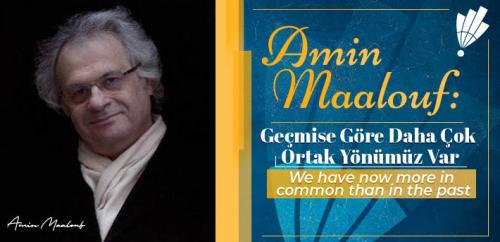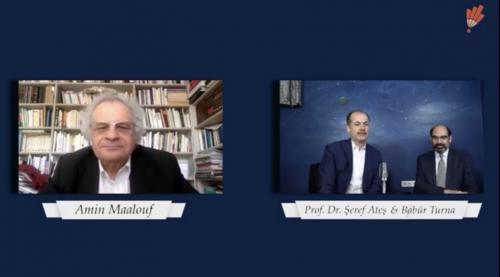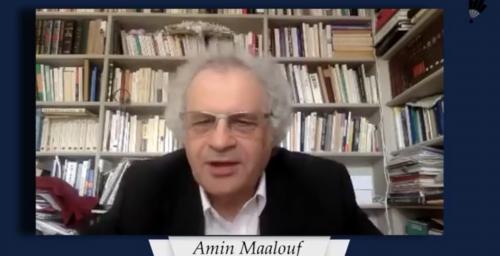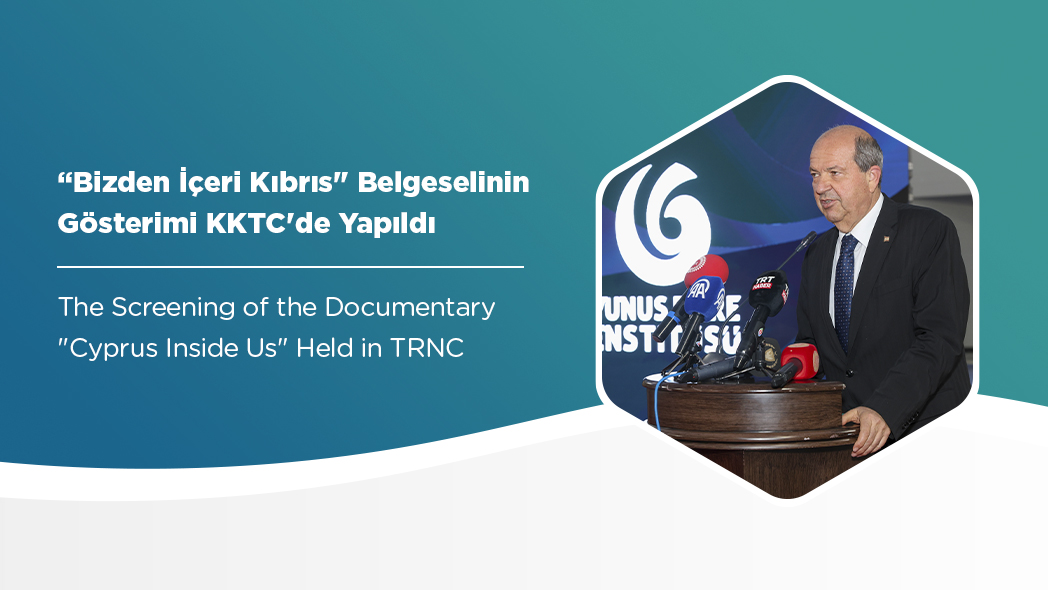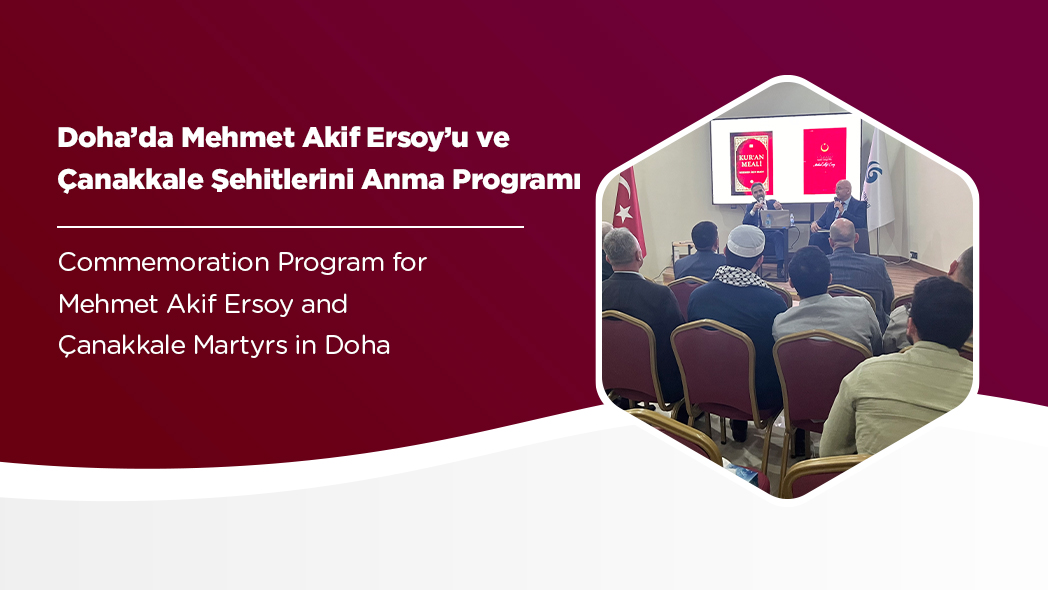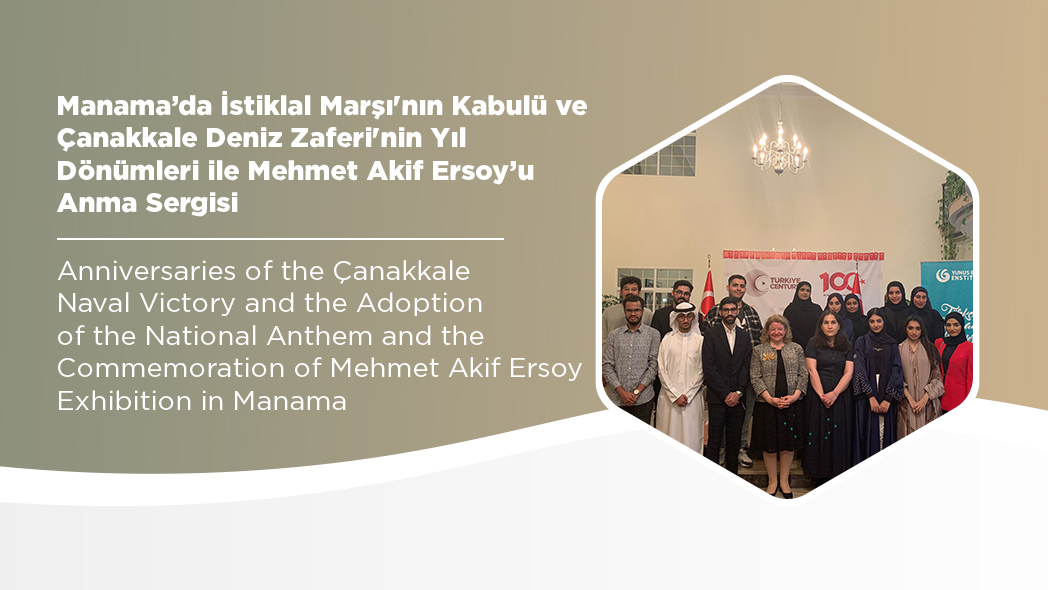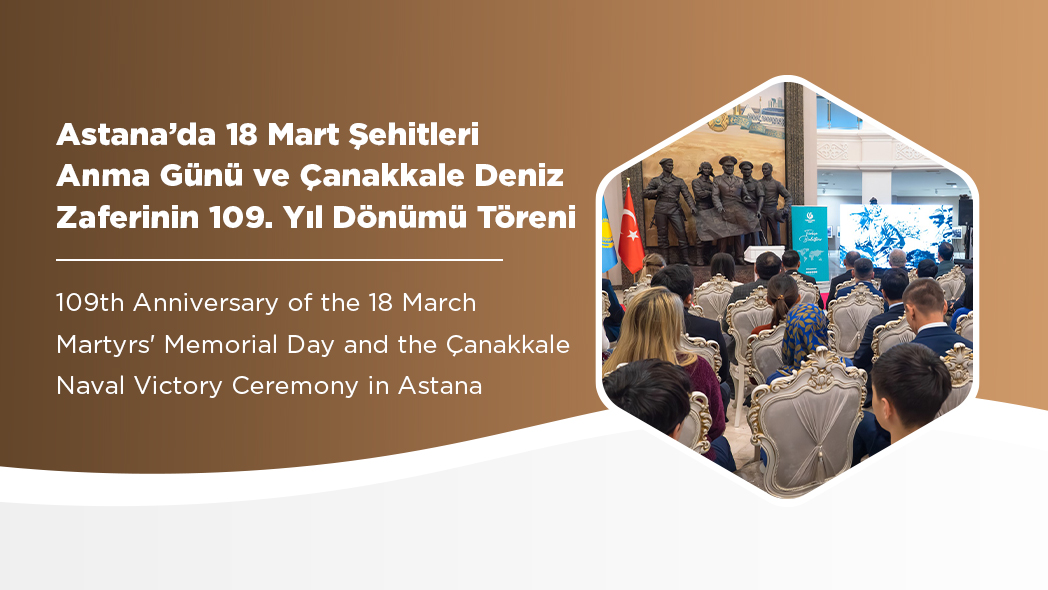Amin Maalouf: We have Now More in Common than in the Past
Yunus Emre Institute has hosted Lebanese writer Amin Maalouf, whose works have been translated into more than 40 languages. Institute President Prof. Dr. Şeref Ateş' guest was Maalouf, in the program he presented "Rethinking, Reinterpreting." In the program, Prof. Ateş and his guest Maalouf talked about literature, culture, the process of being a writer, inter-communal communication, shared memory, colonialism and human rights, as well as the dilemma between modernity and cultures. Thousands of people watched the pleasant conversation published in Turkish, Arabic and English through the social media accounts of the Institute. Maalouf indicated that the effect of the spirit of time is very important in interpersonal partnerships. “We have relations with everyone living today. When compared to our relationship with our grandfather, we have got much more in common with people of our time no matter wherever they live, let them live in France, Turkey, Korea, or Japan," he said.
Lebanese writer Amin Maalouf was the guest of Yunus Emre Institute's broadcast on Friday, July 10, which took place within the scope of the program "Rethinking, Reinterpreting." Yunus Emre Institute President Prof. Dr. Şeref Ateş has hosted Maalouf, whose works have been translated into more than 40 languages. The program, published in Turkish, Arabic and English, was watched with interest by thousands of people.
"Thinkers do not enjoy consumption. Thinkers augment the thoughts they produce for the benefit of humanity by sharing them with all people," Prof. Dr. Şeref Ateş said to open the conversation. In the program, Prof. Dr. Şeref Ateş was accompanied by Babür Tuna from Yunus Emre Institute's Ankara branch and Fahri Akdoğan, Director of Yunus Emre Institute's Belgrade branch. In the program, Maalouf answered questions on such topics as the effect of language on literature, culture, the spirit of times, inter-communal communication, shared memory, colonialism and anti-human rights, the role of literature, and the dilemma between modernity and cultures.
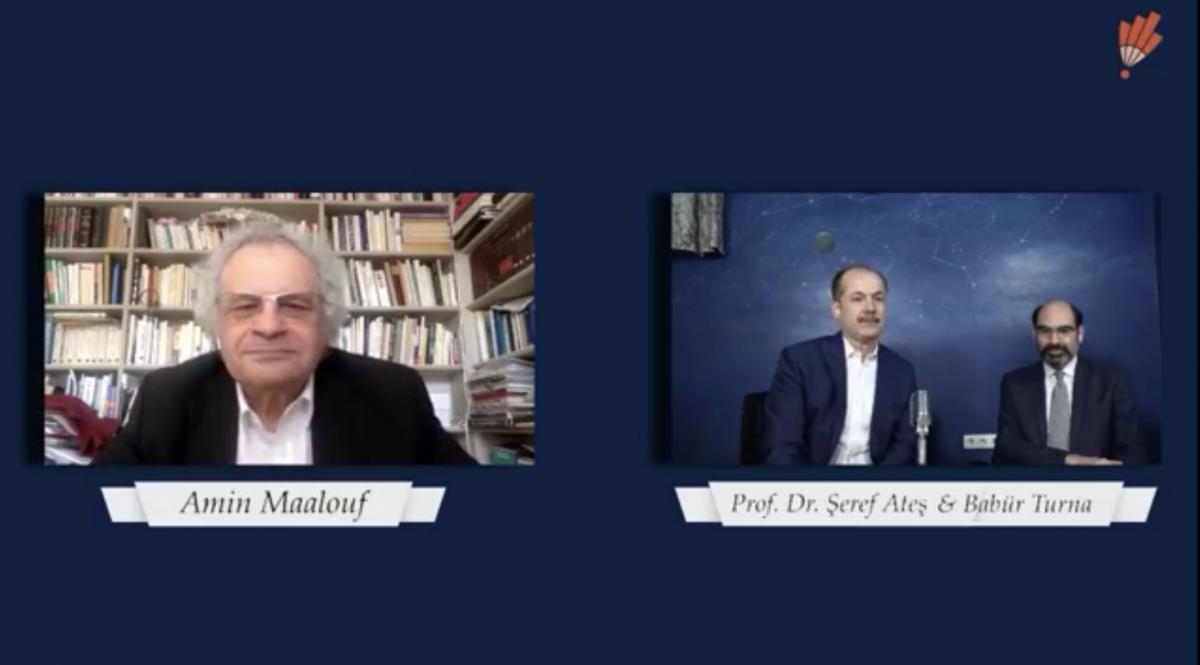 “Düşünce insanları tüketimden haz duymazlar. Düşünce insanları insanlık yararına ürettikleri düşüncelerini tüm insanlarla paylaşarak çoğaltırlar.” sözleriyle söyleşiyi başlatan Prof. Dr. Şeref Ateş’e Ankara Yunus Emre Enstitüsünden Babür Tuna ve Belgrad Yunus Emre Enstitüsü Müdürü Fahri Akdoğan eşlik etti. Programda Maalouf, dilin edebiyat üzerindeki etkisi, kültür, zamanın ruhu, toplumlararası iletişim, ortak hafıza, sömürgecilik ve insan hakları karşıtlığı, edebiyatın rolü, modernite ile kültürler arasındaki ikilem gibi konulardaki soruları cevapladı.
“Düşünce insanları tüketimden haz duymazlar. Düşünce insanları insanlık yararına ürettikleri düşüncelerini tüm insanlarla paylaşarak çoğaltırlar.” sözleriyle söyleşiyi başlatan Prof. Dr. Şeref Ateş’e Ankara Yunus Emre Enstitüsünden Babür Tuna ve Belgrad Yunus Emre Enstitüsü Müdürü Fahri Akdoğan eşlik etti. Programda Maalouf, dilin edebiyat üzerindeki etkisi, kültür, zamanın ruhu, toplumlararası iletişim, ortak hafıza, sömürgecilik ve insan hakları karşıtlığı, edebiyatın rolü, modernite ile kültürler arasındaki ikilem gibi konulardaki soruları cevapladı.
"ARABIC LANGUAGE AND EVERYTHING I READ HAS IMMENSE INFLUENCE ON ME"
"Your readers are very pleased with the use of tales of wisdom in your books. I want to ask a question about your stories that are full of the journeys on which you take your readers. I wonder if this is due to an effect of the Arabic language?" asked Prof. Dr. Ateş. Amin Maalouf's reply was as follows:
Maalouf: When I start writing a book, what I'm mainly interested in is how I would tell my story. How would I ensure that readers are deeply interested in the story? How will I ensure the readability of the story at the same time? That's it, I am more interested in these while writing a book. |
"Yes, you are absolutely right. I also think that my country and my mother tongue has an impact on me. At the same time, everything that I have read throughout my life has an impact. I think a writer is not the best person to comment on what he wrote. That is because I never think about tales or what I have been impacted by. When I start writing a book, what I'm mainly interested in is how I would tell my story. How would I ensure that readers are deeply interested in the story? How will I ensure the readability of the story at the same time? That's it, I am more interested in these while writing a book. Therefore, I do not have an external perspective about my books or my work in this way. I think this vision is something that readers will feel better."
"WE ARE BOTH THE CHILDREN OF OUR PARENTS AND OUR TIME"
Prof. Dr. Ateş's next question was "As a person who has experienced mentalities of both the East and the West, is there any difference in the sociological approach of the societies to emotionality?" Maalouf answered it as follows:
"WE ARE BOTH THE CHILDREN OF OUR PARENTS AND OUR TIME"
Prof. Dr. Ateş's next question was "As a person who has experienced mentalities of both the East and the West, is there any difference in the sociological approach of the societies to emotionality?" Maalouf answered it as follows:
Maalouf: I think there are differences in perceptions from one society to another. But there are also differences between the perceptions of one individual and another within the same society. As a historian said: We are the children of both our parents and our time. That is, we are related to the time we are in; at the same time, everything around us affects us. In the same way, the language that we write and speak also has an effect on us. Our gender and age, all have an effect. I am sure that what I wrote at the age of 70 is much different from what I wrote at the age of 30. |
"Yes, I think there are differences in perceptions from one society to another. But there are also differences between the perceptions of one individual and another within the same society. As a historian said: We are the children of both our parents and our time. That is, we are related to the time we are in; at the same time, everything around us affects us. In the same way, the language that we write and speak also has an effect on us. Our gender and age, all have an effect. I am sure that what I wrote at the age of 70 is much different from what I wrote at the age of 30. So as everything changes, the place where we live changes us a lot. The world we live in also changes us a lot. Now if I have to answer more directly, yes, I think there are differences between societies. But these are not much more important than the differences between individuals, that is among individuals within each society."
"WE HAVE NOW MORE COMMON THAN IN THE PAST"
Maalouf stated that the concept of Zeitgeist or the spirit of the times, noted by Prof. Dr. Ateş, is quite influential and explained how especially the equivalent of this concept today paves the way for partnerships among people around the world regardless of nationality as follows:
Although we cannot directly say that I am influenced by the spirit of the times, we are of course influenced by it... And now we have relationships with everyone living today. When compared to our relationship with our grandfather, we share a lot and we have got much more in common with people of our time no matter wherever they live, let them live in France, Turkey, Korea, or Japan. So if I were to meet my great-grandfather today, I wouldn't have much to share with him. |
"Although we cannot say that I am directly influenced by the spirit of time, we are of course affected. Even if we don't feel this way, we can understand its relevance to us. And now we have relationships with everyone living today. When compared to our relationship with our grandfather, we share a lot and we have got much more in common with people of our time no matter wherever they live, let them live in France, Turkey, Korea, or Japan. So if I were to meet my great-grandfather today, I wouldn't have much to share with him. Because our references are very different from each other. But if I met someone living in Korea for example, and we could speak the same language, which usually happens to be English, then we would see that many things are common among us. This is what I mean by the spirit of time."
Prof. Dr. Ateş pointed out that countries such as the US, Russia and France developed great perspectives on humanism, but these perspectives were not applied to the Middle East and Africa and asked Maalouf about the contradictions between the approach of Western societies to ethics and colonialism.
Maalouf stated that the historical ground of colonialism is quite broad. "Depending on age, for example, the United States did not have colonies in the sense that France had colonies. Russia, too, did not have any colonies like France, England and Belgium had colonies. Russia expanded, but it expanded continentally. Therefore, it was not obvious that the places occupied were colonies. The USA was already a colony in itself. But, then, he started to play a role. This actually happened in the very recent past. The United States did not play an international role; it was a very marginal force until the end of the 19th century and the beginning of the 20th century. The United States, however, exerted influence. The US exerted influence in different parts of the world he did not have any colonies in the sense that France had, and for a while it had a militant attitude to the idea of colonization. So at the end of the First World War they said, for example, that all the people of the world can determine their own destiny. So the attitudes about colonialism have always been very different. It also has another aspect, which is colonization by population," he said.
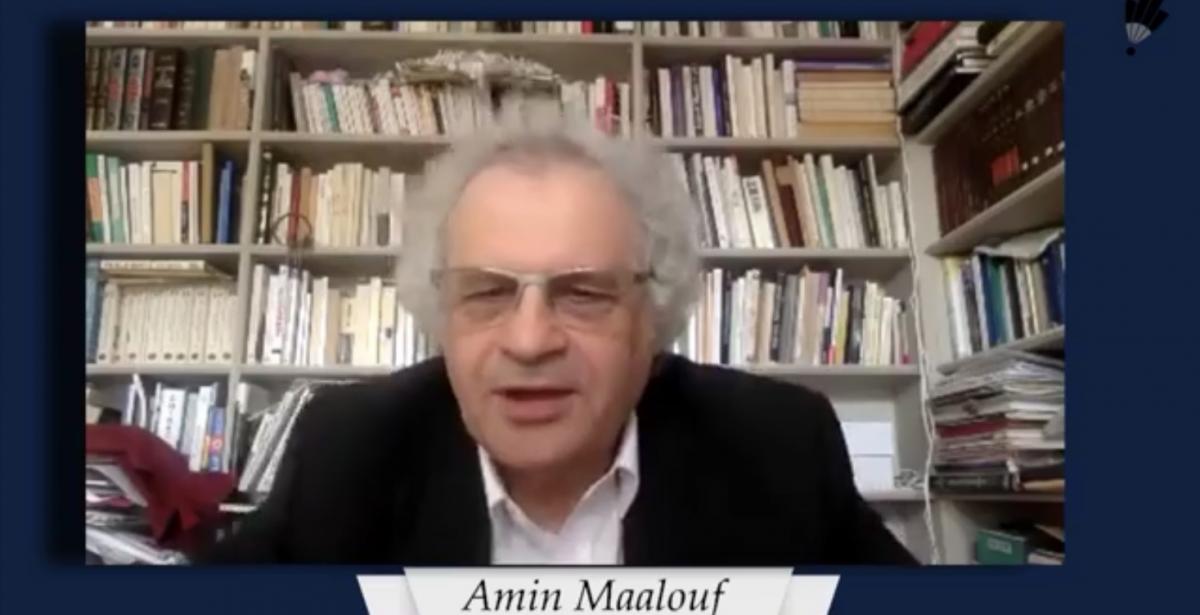 "I SPARE MOST OF MY TIME TO UNDERSTAND THE WORLD"
"I SPARE MOST OF MY TIME TO UNDERSTAND THE WORLD"
"You are not afraid to express your political views clearly. The opinions you present are very clearly expressed and not too open to misunderstanding. I wonder if this is because of your career as a journalist," Professor Dr. Ateş commented. Amin Maalouf confirmed Prof. Dr. Ateş' words saying that sometimes he repeatedly, sometimes spending weeks, checks what he writes to express his thoughts clearly.
Maalouf indicated that he does not like provocation and asserted that understanding the issues is an important and difficult, yet a humane mission. Maalouf spoke about his efforts to understand the world as follows:
Maalouf: The world is a very complex, but still understandable. The world is not opaque; it is not something that is full of only mysteries; I think the world is a rational reality. And it is understandable if we look quietly and with serenity and try really understand what is happening with humility... |
"It's not easy at all, but I think it's our duty as a human being: understanding the world, then trying to explain it, explaining it in a way that makes it more understandable, not in a way that makes it less understandable. So first of all, I value clarity on this issue, on making it more clear and I try to simplify a number of things, but I am not trying to make it too simple. Because the world is a very complex, but still understandable. The world is not opaque; it is not something that is full of only mysteries; I think the world is a rational reality. And it is understandable if we look quietly and with serenity and try really understand what is happening with humility... And I devote a lot of time in my daily life to understand what's going on in the world, in the world around me."
"YOU CAN'T SEE BEYOND WHEN YOU ARE DROWNED IN A CERTAIN SITUATION"
Referring to the story of Prophet Moses being the only one who did not grow up among the Israelites and saved them, Prof. Dr. Şeref Ateş asked, "In your opinion, could Moses have saved the Israelites if he had grown up among his own people?"

Maalouf replied: "To be frank, I don't know a lot about Moses, but I've read a few things and noticed what many specialists say something like this... But what you said is really interesting. This is actually related to how people can overcome a certain situation. So when you are completely drowned in a situation, it is very difficult to see beyond that situation."
Maalouf said that before his presidency, President Carter's advisor Hematon Jordan thought that he had a very shy character to become the president; and to overcome this situation, he introduced him to former US Presidents.
"So he decided to invite every personality who came from Washington, presidents, former presidents and vice presidents, and introduced them to him. So President Carter could see that they are humans just like him and they have their weaknesses. That helped President Carter go beyond the shyness, that is the shyness of Carter as a local politician and decide to enter the presidential elections. I told you the story. Why? Because sometimes a person who lived in this way, for example, a person who lived in a palace, and a person who has known rulers sometimes has an ability to see their weaknesses, and sometimes to fight against them," he said.
"ATTILA CONQUERED THE CASTLE FROM THE INTERIOR"
Maalouf pointed out that the fact that Attila the Hun, the Emperor of the European Huns, was raised in the Roman palaces was effective in his success:
Maalouf: Attila was actually raised in Roman palaces. And he used to be very close to the Roman aristocrats when he grew up. In other words, the conflict he had with Rome was actually the conflict that a person who knew Rome from the interior. This is what helped Attila, at some point. It also helped him oppose and fight against the Roman Empire. In other words, somebody who lives outside the community has sometimes the possibility of seeing things that people who are in the community do not see. |
"Everyone knows Attila; after all he is a very important personality. But very few people know that; Attila was actually raised in Roman palaces. And he used to be very close to the Roman aristocrats when he grew up. In other words, the conflict he had with Rome was actually the conflict that a person who knew Rome from the interior. This is what helped Attila, at some point. It also helped him oppose and fight against the Roman Empire. In other words, somebody who lives outside the community has sometimes the possibility of seeing things that people who are in the community do not see."
"SOMEONE WITHOUT WOUNDS CANNOT WRITE"
Babür Tuna asked: "What do we need to do in order to establish a healthy communication between people when you consider the permanent wounds of man? Is it possible to establish such a relationship with these permanent wounds?" Maalouf answered Babur's questions as follows:
Maalouf: I think the ink we use to write is like blood flowing from a wound. So you must have a wound. |
"Wounds are like assets for us. So we need these wounds. In fact, these wounds are like existing, in order to feel life, to feel where we are in this world, and understand everything; and I think no writer can write without wounds. I think that no one without wounds can write well. Maalouf: I think the ink we use to write is like blood flowing from a wound. So you must have a wound. Although it is not always obvious which wound it is, there are always wounds. After all, we cannot live without our wounds. We need to take control our wounds in some way and use them to promote our lives, to improve our lives… So we are in such a world that everyone has some fears, and often these fears are legitimate fears even if sometimes they are exaggerated or some are invented; yes, there are some legitimate fears, and my humble solution is to try to understand. Let's try to understand. Let's try to understand mainly through history, through learning history, and really try to find out if there are ways to overcome these fears."
"THE DUTY OF LITERATURE IS BRINGING PEOPLE TOGETHER"
"How should a writer approach the issue when he writes about communities among which there are conflicts and disagreements?" asked, to which Maalouf responded as follows:
Maalouf: The role of literature should be as follows: To bring people together and bring them together on a very solid basis. I mean not just by lying or describing the world as if it were an idyllic place. No, there are real problems in the world; there are real conflicts. And, to be honest, we are not going towards a world of peace and tranquility. We are now heading towards a world of violence. |
"I think culture is sometimes an element of peace, but not always… Very often one hears that these two nations, for instance, they have so much in common but their interests are opposed. The opposite might also be the case. Sometimes the interests can actually bring them together, but their cultures can be against each other and there can be real differences in cultures. We cannot say that culture always brings people together. The role of literature should be as follows: to bring people together and bring them together on a very solid basis. I mean not just by lying or describing the world as if it were an idyllic place. No, there are real problems in the world; there are real conflicts. And, to be honest, we are not going towards a world of peace and tranquility. We are now heading towards a world of violence. We are in a world full of wars and conflicts, and I think the role of writers today is to understand the world as it exists and try to describe it as it is and to do this in a credible and reliable way and think about the possibility of going out of this tragedy we are living in on many levels. So, literature has a role, but this is not a very simple, very straightforward role; literature has a very complicated role…"
"OLD STORIES SHOULD BE ADAPTED TO OUR DAY"
"Traditional story telling (meddah in Turkish and Arabic) has a very important place in both Turkish and Arab culture; however, new generations are having a childhood that is totally detached from fairy tales, stories, legends. What kind of repercussions would this detachment lead to in the future? Children growing up without hearing fairy tales, stories, legends, what type of a future world would those children build?" was Tuna's another question. Maalouf replied to Tuna's question as follows:
"Storytelling is important in every society. In both ancient and modern societies. In France, for example, there is something called a national novel... I think every nation in the world needs a way to tell its story. The story told in America, which has a multinational structure, does not appeal to all the societies it consists and these nations are against it."
Maalouf continued with an example from his own country, Lebanon. "One of the problems we have is that there is not one national story told by everybody. Each community has its own story... Because for a nation, to be a nation, we must be able to tell the story of the people we are related to both in the past and today; and that doesn't have to be the same story told two centuries ago. What we need is a story adapted to today's reality by taking elements from the story told two centuries ago. Therefore, in my view, storytelling is really important. The memory of a society is very important and for me every element of the past must be known. But not always these elements are inspiring. They are not ideal. Sometimes they need to be known to be criticized and overcome. But ignoring the past is never a solution," he said.
"MODERNIZING WITHOUT LOSS OF IDENTITY IS DIFFICULT BUT NOT IMPOSSIBLE"
Stating that this westernization process, which started in the 19th century, unfortunately resulted in a failed imitation, Babür Tuna asked whether a voice which both unique and universal at the same time could be produced in this geography in the 21st century. In response, Maalouf pointed out that Chinese, Japanese, Russian, Arab, Indian and Turkish societies have a history of dealing with the Western model.
Maalouf: How do we give things that will add value to all humanity while we give things, which are the elements of our own past or our own culture? This is something, which is not easy to achieve. But that's the task of our generation. |
"The dilemma experienced was this: How can this modernity be taken without losing our identity? And sometimes when you take modernity in a certain way, you may lose part of your identity. Sometimes you refuse to take certain elements of modernity for the sake of protecting your identity; then, you end up lagging behind, not being able to cope with the realities of the world. So it's a very delicate balance. And no one can get it just at one stroke. For example, let's have a look at the Chinese. How many revolutions, how many upheavals there were with Sun, Yang Sen, at Max Tung? And now they have reached some kind of equilibrium, in which they get the best of capitalism and at the same time they maintained important elements of their culture… So how will we develop, how will we become powerful and advanced? How do we get all the science in the world? But at the same time how do we remain ourselves and develop something, which we can really give the whole world, such as ideas, values that are really relevant to the world, which cannot only be elements of our own past or our own culture; we have to give things that are really valuable to all the humankind? This is something, which is not easy to achieve. But that's the task of our generation and it will probably be the task of all generations in this part of the world from now on," he said.
"SEMIRAMİS REPRESENTS LEBANON"
In response to Fahri Akdoğan's question of whether the character of Semiramis symbolizes Lebanon in the book "Les Désorientés (The Disoriented)" by Maalouf and what he could tell about the symbolism in the work, Maalouf answered:
"For example, Adam is partly myself... When Adam leaves, Semiramis remains in the country. So you are somehow right in a sense, she is the reflection of a country in the person, the personification of the country. But the name itself, Semiramis, is a name that comes from Mesopotamia and it is the name of a figure, which was half mythical. Nobody knows exactly what she is. Was she a queen or a deity? But in the book is presented as a symbol of Lebanon, the people who remain in Lebanon, and also as a symbol of the entire region, which is already such an ancient region, a region that is the cradle of many civilizations. Semiramis expresses all of this. In addition, there is an old lady from Iraq in the novel. It is also a way of linking Semiramis to ancient history of that part of the world."
"ONE DAY ONE MORE TIME..."
Stating that this part of the world is his home country and his home civilization, Maalouf continued as follows:
Maalouf: The more we go back in history, the more we see that the region is the center of the world... Of course, my dream is that my region becomes the center of the world once again in some way. Still, I feel sadness. And I think there is such a sadness in the hearts of all the people who love this part of the world and observe all the dramas and tragedies currently taking place in that part of the world. |
"There are some very sad aspects in it; because I think it made its history in a reversed way. We expect a country to move forward from backwardness to making progress and from poverty to prosperity. But that part of the world is presently perhaps one of the worst. The more we look back at history, when we look 50 years, 100 years, or 500 years, or thousands of years back at history, the more we discover that the place of that part of the world was more important and it was the center of the world some time. We see that this region gained that much importance for the world. Of course, my dream is that my region will become the center of the world once again in some way. Still, I feel sadness. And I think there is such a sadness in the hearts of all the people who love this part of the world and observe all the dramas and tragedies currently taking place in that part of the world."

